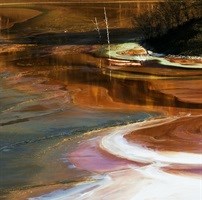
Top stories






More news


Marketing & Media
Ads are coming to AI. Does that really have to be such a bad thing?














The Selati River‚ an important tributary of the Olifants River‚ was polluted with acid mine water‚ killing a "massive" number of fish after heavy rains contributed to the overflow of an impoundment dam at Bosveld Phosphate's fertiliser manufacturing plant in Phalaborwa‚ the company said.
Acid mine water contains high levels of heavy metals and salts. It has affected vast areas of SA and is an urgent problem in the Witwatersrand where it is projected that if the problem is not addressed in the area that is Africa and SA's economic hub‚ it will lead to shortages of usable water from this year.
Department of Water Affairs compliance monitoring and enforcement director Nigel Adams said criminal charges had been laid against the Bosveld Phosphate mining operation‚ and the department was also taking administrative action against the miner.
Company spokesman Brian Gibson said Bosveld Phosphate engineers had responded immediately to the emergency and the leak was repaired within 24 hours.
However‚ it was later found on December 31 that a concrete storm-water canal on the site had cracked due to water pressure‚ allowing ingress of polluted process water and resulting in a secondary leak into the river. This was reduced to a trickle by January 1 and stopped completely on January 6.
"Bosveld is confident that‚ due to the very high dilution factor caused by strong flows in the Selati River and the Olifants River downstream‚ there will be no lasting harm to the environment‚" he said.
"The Bosveld team has been wrestling with a legacy water management challenge since acquiring the mothballed plant from Sasol in October 2011 and starting operations early in 2012.
"The challenge was compounded by the extraordinarily high rainfall in the Phalaborwa area over the past two years‚ exceeding the 50-year flood level in January 2012 and 100-year flood level in January 2013‚ exacerbated by very high rainfall in December 2013."
Last year a team of 30 scientists found that mining‚ industrial‚ agricultural and sewage pollution had caused a toxic soup that threatens the future of Mpumalanga's Olifants River - estimated by the Council for Scientific and Industrial Research as South Africa's third hardest working river - and the health of the people and animals living in its catchment basin.
SANParks said in a statement that investigations into the environmental impact of the spillage continued and would be made public once concluded. There was also continuous monitoring of the rivers affected to assess their condition.
Gibson said Bosveld Phosphate directors would continue with their efforts to put in place long-term corrective measures that were agreed in close consultation with external specialists and the relevant authorities‚ and thanked Department of Water Affairs‚ SANParks‚ Palabora Copper and Foskor "for their support and assistance over the last week".
SANParks said it had taken "immediate precautions" to ensure safe water supply to tourist camps in the park. Camps dependent on water from the Olifants River had been switched onto back-up borehole water‚ with associated water-use restrictions to ensure the water demand could be met.
"The Department of Water Affairs and South African National Parks are co-operating closely on investigations into this incident and are conducting in-depth investigations into the associated environmental impacts.
"Intensive monitoring of the environmental conditions is ongoing to evaluate the scale of the degradation‚" SANParks said.

For more than two decades, I-Net Bridge has been one of South Africa’s preferred electronic providers of innovative solutions, data of the highest calibre, reliable platforms and excellent supporting systems. Our products include workstations, web applications and data feeds packaged with in-depth news and powerful analytical tools empowering clients to make meaningful decisions.
We pride ourselves on our wide variety of in-house skills, encompassing multiple platforms and applications. These skills enable us to not only function as a first class facility, but also design, implement and support all our client needs at a level that confirms I-Net Bridge a leader in its field.
Go to: http://www.inet.co.za